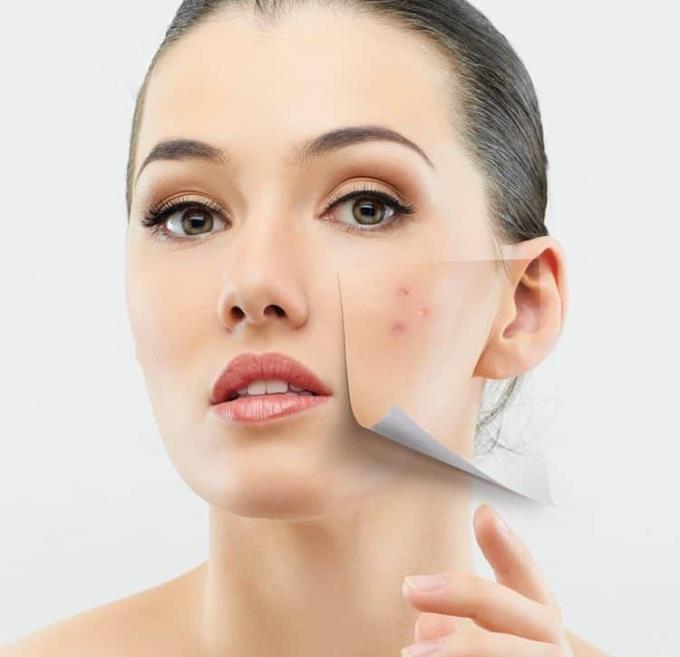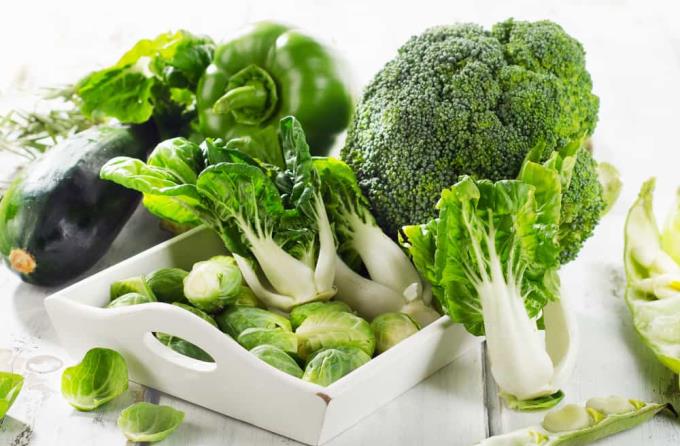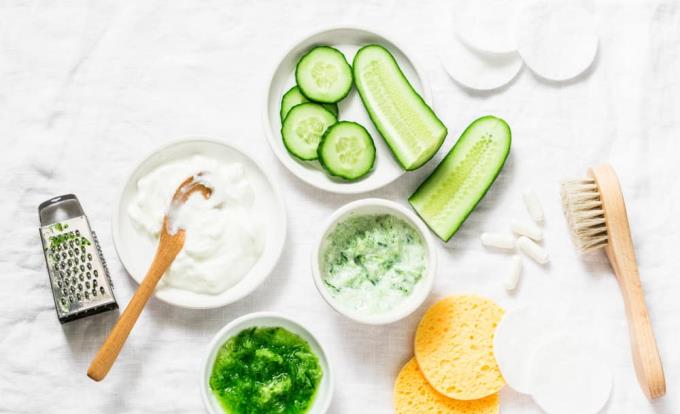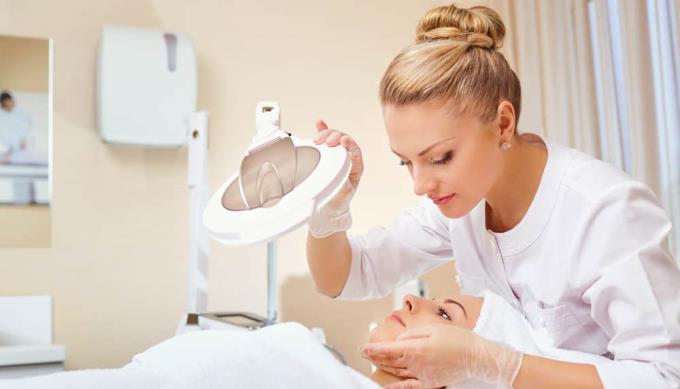Do you get lots of acne during pregnancy? Hormone changes during pregnancy lead to this condition. There are many remedies to help reduce acne.
Acne is often simply called blemishes or pimples. This is a condition involving the sebaceous glands under the skin. The path of sebum that connects the pores to the sebaceous glands is called the hair follicle. Red bumps form when your hair follicles are clogged with slime and dead cells, leading to inflammation.
If the pores are only partially blocked, then blackheads will turn into black due to oxygen exposure to form blackheads . Also whiteheads formed by clogged pores completely with the surface is covered. As a result, pimples are usually white or in color close to the skin. If left on for a long time, both types of acne can swell or turn into acne.
Find out what causes acne during pregnancy

Here are a few reasons why acne flare-ups during pregnancy:
1. Hormonal changes in early pregnancy are the main cause of acne growth. The proliferation of the androgen hormone causes the skin to produce more sebum, causing the pores to become blocked, allowing bacteria to grow.
2. If you use oil-based makeup and skin care products, your risk of getting acne is very high.
3. If you have had acne in the past, the risk of breakout during pregnancy is very great. Also, if you often get acne before your period, you are more likely to "live with" it during your pregnancy.
4. Immune system factors that make your skin sensitive. A weak immune system causes bacteria to multiply in the pores, causing inflammation.
Acne is not a serious problem, but it can affect a pregnant woman's psychology.
How when acne appears dense?
If only mild, you will not notice. However, if you get severe, you will spend all day thinking about it. Here are a few ways you can handle this:
1. Mild acne
Mild acne is usually only associated with whiteheads and blackheads. In addition, they will not appear in large patches on your face. Regular skin care treatments can alleviate this.
Treatment
Ask your dermatologist about skin treatments. Non-acnegenic (non-comedogenic) products may also help prevent acne . However, you should still speak with your doctor before use.
When using topical medications, read them carefully and follow the directions on the package. Do not change drugs constantly. Alternatively, you can also use some gentle cleanser or moisturizer. If your acne doesn't improve after 8 weeks, see your doctor again.
2. Moderate acne breakout during pregnancy
Moderate acne is when the bumps have already begun to swell, red, and pus on the inside. Also, these bumps have spread quite widely on your face. It takes a long time to treat it.
Treatment
See your doctor. At this point, your doctor may prescribe a number of antibiotics. Monitor for 12 weeks or as directed by your doctor. If this condition is not treated promptly, it will leave scars on the skin.
3. Severe acne
Severe acne is when acne marks appear deep, large lumps under the skin. Also, the pimples have spread all over the face. When you fall into this situation, you should get treatment right away to avoid permanent scarring.
Treatment
If this is the case, you should see your doctor first. After receiving the prescription, take it as required.
Measures to control the spread of acne during pregnancy
As pregnant skin changes a lot during pregnancy, there are a few steps you can take to prevent and reduce the risk of acne spreading during pregnancy.
1. Keep skin clean

Use a gentle cleanser to clean pores. Wash your face twice a day in the morning and before going to bed. After washing is finished, wipe gently with a clean, non-rubbing cloth.
Keep the jawline area contoured with clean hair as these areas are the most likely to get clogged. Also, when washing your hair, don't use oily shampoos.
Wash the pillowcase regularly to avoid contact with any residue left on the pillow. Do not wash your face too many times as this will strip the skin of its natural moisture. Finally, avoid using hot water when washing your face as this can dry out your skin.
2. Do not rub the pimple area
When washing your face, do not scrub the area where the pimple is affected as it can make the situation worse. During pregnancy, your skin is so sensitive that even light scrubbing can cause injury. As a result, rubbing excessively will cause the skin to lose moisture, making the sebaceous glands more active. In addition, squeezing pimples at this time can also cause permanent scarring. Therefore, you should only gently wipe your face with a soft cloth or with your hands. Wash your face thoroughly, using an oil-free moisturizer.
3. Avoid exposure to too much sunlight
Overexposure to the sun not only damages skin, but also causes acne to appear. When you go out, use sunscreen to prevent damage. More importantly, you should choose a sunscreen that is suitable for oily skin and acne prone skin.
4. Moisturize the skin

Use an oil-free moisturizer specifically designed for acne-prone skin. This will help retain moisture in the skin. Besides, do not wash your face too often as this will cause the skin to lose moisture. Remember one thing: using the right moisturizer will help maintain the skin's pH.
5. Avoid makeup while treating acne for pregnant women
You should limit makeup when you have acne. However, if you must do this, opt for oil-free cosmetics. Remove makeup as soon as possible.
6. Eat healthy foods
Limit sweets to reduce acne. Avoid baked and fried foods as they contain a lot of unsaturated fats, making skin prone to blemishes. Instead of sugar, switch to honey. Eat a variety of seeds, fresh fruits, green vegetables, oranges to supplement the necessary nutrients for the body. Before changing your diet, talk to your doctor to ensure the health of you and your baby.
7. Supplement vitamin B2

A deficiency of vitamin B2 can cause the skin to produce more sebum. There are plenty of vitamin B2-rich foods that you should consume such as green vegetables, spinach, asparagus, and almonds.
8. Drink plenty of fluids to prevent acne during pregnancy
Drink plenty of water every day because if you lack water, your skin will be dry. You can try some nutritious drinks like fresh fruit juices, smoothies, milkshakes and vegetable juices. This not only helps to replenish water for the body but also helps replenish nutrients to limit acne flare-ups.
The above measures only help you to control the spread of acne, not completely eliminate them. So try some of the following remedies to treat acne for pregnant women.
Some natural remedies for acne during pregnancy
Acne is temporary and can be treated if you know how to take care of your skin. Here are some natural remedies to try:
1. Coconut oil
Prepare a few drops of natural coconut oil . Wash and massage your face with water, then use coconut oil to massage the acne area for 1-2 minutes and leave overnight. You should do this every night.
Coconut oil is famous for its antibacterial and antifungal properties. Therefore, it will help you fight off the bacteria that cause acne. In addition, coconut oil helps to moisturize and nourish your skin.
2. Apple cider vinegar

Get some fresh, unprocessed apple cider vinegar. Then, mix apple cider vinegar and water in a 1: 3 ratio. Soak a towel in this mixture, then apply it to the affected area to absorb the oil. You should do this 1 time / day.
3. Treatment of acne for pregnant women with Baking soda
Prepare some baking soda. Then, add 1 teaspoon of baking soda to the water and apply it to the affected area. Let dry before washing. You should do this 2-4 times / week.
Baking soda helps to remove sebum from the skin. In addition, it is also known for its antibacterial and anti-inflammatory properties.
4. Fruits of the citrus family
Prepare a lemon. Squeeze a few drops of lemon juice and dissolve it with water, then apply directly to the affected area with a cotton ball. Leave for about 10 minutes until dry, then rinse with clean water. You should do this once a day.
Lemons contain alpha hydroxy acid which helps to clear pores and remove dead cells.
5. Honey

Prepare a few drops of honey. After washing your face with warm water, apply honey directly to the affected area. Leave on for 20-30 minutes and then rinse with warm water. You should do this twice a day, in the morning and in the evening.
Honey has antiseptic and antibacterial properties. Besides, it also helps to soothe your skin.
6. Use turmeric to treat acne during pregnancy
Have a teaspoon of turmeric powder available with a little water. Then, mix these 2 together and apply to the affected area. Leave it on for an hour or so before rinsing it off with water. You should do this every day.
Turmeric is a natural antiseptic and helps to brighten the skin. In addition, it is also capable of preventing urticaria and improving skin quality, color, and texture.
Note: When using this method, you should wear old clothes because it can be difficult to wash when turmeric gets on them.
7. Aloe (aloe vera)
Prepare some aloe vera, then slice and take the gel inside. Apply directly to face and massage gently. Leave for about 30 minutes and then rinse with water. You can also leave it on overnight if it doesn't feel uncomfortable. Do this every night before going to bed.
Aloe vera is a miracle remedy for skin-related problems. Besides, it also helps reduce acne and provides essential nutrients to help skin become younger.
8. Tea tree essential oil

Place 1-2 drops of tea tree oil in a bowl with 1 drop of lavender oil and 4-5 drops of virgin coconut oil or olive oil. Mix these essential oils together, apply directly to the affected area and leave overnight. You should do this every night before going to bed.
The antioxidant and antibacterial properties found in lavender oil and tea tree oil help reduce acne breakouts and fade scarring.
Note: Essential oils may not be suitable for everyone. Therefore, you should only use them if you are not allergic to them. Before using, be sure to consult your doctor.
9. A clay mask for pregnant women with acne
Have some clay, a few drops of rose water, and a few drops of lemon juice ready. Add a few drops of rose water and 1-2 drops of lemon juice to the clay, then apply to the affected area. Leave on for about 5 minutes and rinse with warm water. You should do this about 3 times a week. This method helps to limit sebum secretion and helps pores to no longer be clogged.
10. Papaya
Prepare one green enough fruit. Take the meat and mix it with water, then apply directly to the skin. Leave on for 5-10 minutes and then rinse with warm water. You should do this every day because it is very effective in removing dead cells and limiting the production of excess slime.
11. Cucumber and oatmeal

Have a diced cucumber and some oatmeal ready. Mix cucumber with oatmeal and refrigerate. Then, apply on face and let sit for 10-15 minutes. You should do this regularly as it helps soothe the skin, reduce acne.
If, after using these methods, your acne doesn't go away, take the medication your doctor has prescribed. However, you need to be cautious about using them during pregnancy.
Question: Is acne a sign of pregnancy?
Hormonal changes in your body during pregnancy cause acne to work hard on your skin. If you have had acne in the past, you are more likely to experience this symptom during pregnancy. If you have acne, the symptoms will get worse during pregnancy but will gradually subside once the hormones stabilize.
Not every pregnant woman gets acne, but more often than not, it flares up early in pregnancy. After that, the situation will gradually improve and in the last months, the acne worsens again because the hormone fluctuates again.
The proliferation of androgen hormones is just one of the many reasons that cause acne during pregnancy. Besides, there are still a number of other reasons.
Is it safe to treat acne during pregnancy?

Ask your dermatologist about ways to treat this condition. Acne is not a serious condition and it can improve once the hormones are back to normal. So you can decide for yourself whether or not to treat it based on the extent to which you are experiencing.
The safe acne treatments for pregnant women:
Medications that contain zinc sulfate, azelaic acid, erythromycin and clindamycin can be used to treat mild to moderate acne.
Medicines containing salicylic acid are considered safe during pregnancy and can be taken without a prescription.
Benzoyl peroxide is also very safe when used to treat acne during pregnancy. The skin absorbs only 5% benzoyl peroxide, which is then converted to benzoic acid and excreted in the urine.
Azelaic acid is also safe for use during pregnancy because no birth defects have been detected with this drug, according to research.
Creams containing resorcinol or sulfur may also help prevent blackheads and whiteheads.
Low-level glycolic acid cleansers are also harmless during pregnancy.
Antibiotics like erythromycin, azithromycin, and cephalexin also pose no risk.
Note: Do not take any medicine on your own before talking to your doctor because there are some drugs that are not safe for pregnant women.
The method should not be used to treat acne during pregnancy
Medications affect people in different ways. Therefore, it will be difficult to know which medicine is right for you. However, it is better not to take the following drugs:
1. Isotretinoin
Use of Isotretinoin during pregnancy should be avoided because:
It causes birth defects in babies.
The effectiveness of the drug is very strong. Therefore, before use, you need to take certain precautions to avoid risks.
This drug is extremely dangerous for pregnant women. In the average person, the doctor will order birth control pills before taking this drug.
2. Anti-androgen drugs
The use of anti-androgen drugs (spironolactone and flutamide) can also cause birth defects.
3. Tetracyclines treat acne for pregnant women
Tetracyclines antibiotics contain doxycycline and minocycline, which interfere with the growth of bones and lead to discoloration of teeth in the fetus. If you are pregnant at 15 weeks, avoid this medication as it can cause birth defects.
4. Corticosteroid drugs
Corticosteroid medications are also used to treat severe acne. However, the use of this drug may increase the risk of cleft palate, premature birth and miscarriage.
5. Retinoids
Retinoids can enter the bloodstream through the skin and reach the fetus. Retinoids such as adapalen (Differin), tazarotene (Tazorac) and tretinoin (Retin-A) should be avoided during pregnancy as they can negatively affect fetal development .
Acne is not a serious problem that can threaten the health of you and your baby. However, serious acne can make a pregnant woman feel depressed, and that's not good for pregnancy. Try home remedies and change some lifestyle habits. If that doesn't go away, see your doctor and consult.
Some frequently asked questions
1. When will acne go away?
Acne can decrease during pregnancy or after childbirth. Taking good care of your skin will speed up acne reduction.
2. Does acne during pregnancy help determine the baby's sex?
There is no scientific evidence to prove that acne can determine the sex of a fetus . However, according to folklore, if you get a lot of acne during pregnancy, you are more likely to have a baby girl.




















